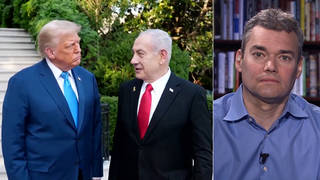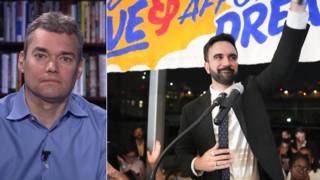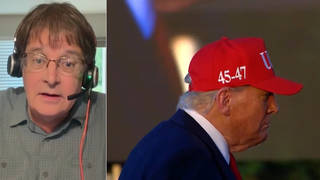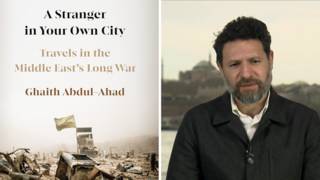
Topics
Guests
- Patrick CockburnMiddle East correspondent for The Independent. He was in Baghdad last month. His new book, The Jihadis Return: ISIS and the New Sunni Uprising, is out this month with OR Books.
The United States is sending 130 more troops to Iraq amidst a bombing campaign against ISIS militants in the north and a political crisis gripping Baghdad. We are joined by veteran Middle East correspondent Patrick Cockburn, author of the new book, “The Jihadis Return: ISIS and the New Sunni Uprising.” Cockburn addresses the power struggle in Baghdad, Hillary Clinton’s claim that President Obama’s “failure” to support Syrian rebels helped fuel ISIS’s advance, the role of oil in the current U.S. airstrikes, and his fears that Iraq is entering a “new, more explosive era far worse than anything we’ve seen over the last 10 years.”
Transcript
NERMEEN SHAIKH: A hundred and thirty additional U.S. marines and special forces have been sent to Iraq. Defense Secretary Chuck Hagel made the announcement Tuesday speaking to marines at Camp Pendleton in California.
DEFENSE SECRETARY CHUCK HAGEL: I recommended to the president, and the president has authorized me, to go ahead and send about 130 new assessment team members up to northern Iraq in the Erbil area to take a closer look and give a more in-depth assessment of where we can continue to help the Iraqis with what they’re doing and the threats that they are now dealing with.
NERMEEN SHAIKH: The news comes one day after the U.S. confirmed the CIA was directly arming Kurdish fighters, known as Peshmerga, who are battling Sunni militants of the Islamic State who have seized large swaths of Iraq and Syria. Earlier today, France announced it would also send arms directly to the Kurds.
The Guardian is reporting the United States is also preparing to send the Iraqi government a shipment of missiles, guns and ammunition, but it is waiting to do so until Haider al-Abadi officially becomes Iraq’s new prime minister. It remains unclear if Iraq’s current prime minister, Nouri al-Maliki, will relinquish power to Abadi, who has the backing of both Washington and Tehran. Maliki has rejected Abadi’s appointment, saying it violates Iraq’s constitution.
AMY GOODMAN: On the humanitarian front, the United Nations says 20,000 to 30,000 Yazidis may still be trapped on the arid Mount Sinjar where they fled, fearing attacks from Islamic State militants. U.N. Special Rapporteur on Minority Issues Rita Izsák said, quote, “All possible measures must be taken urgently to avoid a mass atrocity and potential genocide within days or hours.”
To talk more about the situation in Iraq, we’re joined by Patrick Cockburn, Middle East correspondent for The Independent in Britain. He was in Baghdad last month. His new book, The Jihadis Return: ISIS and the New Sunni Uprising, is out this month with OR Books.
Patrick, it’s great to have you with us from Cork, Ireland. Can you talk about the latest news, the sending of an additional 130 more U.S. marines and advisers, as the U.S. calls them, into Iraq?
PATRICK COCKBURN: Well, it shows a little more U.S. commitment to the Kurds. I don’t think it makes an enormous difference. The most—the really significant action was the airstrikes, although limited, a few days ago. That was important. That raised Kurdish morale. That meant a new U.S. military involvement in Iraq. So I think that’s what’s really significant.
AMY GOODMAN: The situation of what’s happening now in Baghdad with the new prime minister, the current prime minister, and what this all means, who will be the actual prime minister?
PATRICK COCKBURN: Well, I think, you know, that Maliki is finished. I think he’s been finished for some time. The question was: Would he fight it out? He had military units that were personally loyal to him, but he found that after the new prime minister had been appointed, the Iranians had turned against him. They wouldn’t support him. He didn’t have any outside political support. His own party was disintegrating or would no longer support him. So I think that the transition will happen.
But I think what is wrong is to think that—almost everything now is being blamed on al-Maliki, both inside and outside Baghdad, that he was the person who provoked the Sunni uprising, he was the hate figure for the Sunni, he produced an army that was riddled with corruption. But I think that it’s exaggerated, that it’s as if there was a magic wand that would be used once al-Maliki had gone. But there were other reasons for this uprising, for the creation of ISIS—notably, the rebellion in Syria in 2011. This changed the regional balance of power. That was a Sunni rebellion, which Iraqi politicians over the last couple of years were always telling me, if the West supports the opposition in Syria, this will destabilize Iraq. And they were dead right. It wasn’t just al-Maliki.
NERMEEN SHAIKH: Patrick Cockburn, you mentioned that the current Iraqi prime minister, Nouri al-Maliki, is obviously not solely responsible for the situation there now. You’ve also pointed out in a piece that he still retains the support of Iraq’s Shia majority. What do you think the consequences of that will be with this shift in power to Abadi?
PATRICK COCKBURN: I think he did have that support. I don’t think it’s going to last very long, because he had it because he had portrayed himself as the Shia leader who protected their interests, and he tried to get away from the fact he had presided over one of the greatest military defeats in history, when ISIS took Mosul, by claiming that he’d been stabbed—the army had been stabbed in the back by the Kurds, that there had been treachery. But he still had support because he had power, because he controlled the budget, $100 billion, because he controlled millions of jobs. I think once he’s no longer in control of the executive and the money, that support will diminish very fast. There are millions of Iraqis who have their jobs through Maliki. Now that’s changed, and so will their support.
AMY GOODMAN: I want to go back to Defense Secretary Chuck Hagel speaking Tuesday.
DEFENSE SECRETARY CHUCK HAGEL: The Iraqi people, the government of Iraq, country of Iraq is now under threat from some of the most brutal, barbaric forces we’ve ever seen in the world today and a force, ISIL, and others that is an ideology that’s connected to an army, and it’s a force and a dimension that the world has never seen before like we have seen it now.
AMY GOODMAN: Patrick Cockburn, you have written a book on ISIS, The Jihadis Return: ISIS and the New Sunni Uprising. I just want to point out, as it has come as such a shock to people in the United States, you had time to write a whole book about who they are and their rise. But can you respond to what Hagel says? What has added to their surge of power now, and do you think that will change?
PATRICK COCKBURN: Well, as you said, they’d been growing in strength over the last two or three years. They captured Fallujah, 40 miles west of Baghdad, at the beginning of the year, and the Iraqi government didn’t have the power to get rid of them. That showed that they were growing. I think that Hagel—in fact, the U.S. government as a whole—and foreign powers steer away from one very crucial aspect of the rise of ISIS, which is that in Syria, the West backed the uprising against President Assad, and still does, and this enabled ISIS to develop, gain military experience and then use it back in Iraq. Now Washington is saying, “We oppose ISIS in Iraq, but in Syria we want to get rid of the Syrian government,” which is the only real opposition to ISIS. So there’s a different policy towards ISIS in these two different countries. And just as before, ISIS will benefit from that difference.
NERMEEN SHAIKH: And, Patrick Cockburn, you’ve also said about ISIS that it’s made very few military mistakes. Could you explain what you think accounts for the extraordinary victories that it’s had in recent months in Iraq and Syria?
PATRICK COCKBURN: Yes, I mean, it’s this blend, a rather terrifying blend, of extreme religious fanaticism combined with military expertise, and at times caution. Where does that expertise come from? I think it comes primarily from having fought in Iraq in 2004 to 2009 against the Iraqi Shia government and against the Americans, and again gaining experience in Syria. There’s probably the involvement of some former Saddam Hussein officers or special forces, people who have been well trained. But I think a lot of it is just military experience. And when you have a long war, the survivors who are still around and still fighting are probably pretty good at it.
AMY GOODMAN: In an interview with The Atlantic magazine, Hillary Clinton criticized President Obama’s policy on Syria. She said, quote, “The failure to help build up a credible fighting force of the people who were the originators of the protests against Assad—there were Islamists, there were secularists, there was everything in the middle—the failure to do that left a big vacuum, which the jihadists have now filled.” So this has become a big brouhaha. Hillary Clinton and President Obama will be meeting tonight at the house of Vernon Jordan. There’s a big party for Ann Jordan. Hillary Clinton’s people have put out that they’ll hug it out. David Axelrod has tweeted about the issue of stupid moves Hillary Clinton was talking about: Not making stupid moves is not a policy. President Obama, apparently, had talked about not making stupid moves. And David Axelrod said, “’Don’t do stupid stuff’ means stuff like occupying Iraq in the first place, which was a tragically bad decision,” alluding to Hillary Clinton voting for the original attack on Iraq in 2003. But can you talk about this difference? It’s particularly significant, of course, because she is possibly running for president.
PATRICK COCKBURN: True. Yeah, I mean, I was—I’m pretty contemptuous of it, to be honest, because it’s opportunism by Hillary Clinton. And it’s nonsense. You know, the idea, which is very widespread, that there was a moment that, with a few more guns and ammunition, that a moderate Syrian opposition could have taken over in Syria in 2011 or '12 or ’13, is just unreal. There are 14 provincial capitals of Syria. Assad held all of them until last year, when he lost one of them, Raqqa, to ISIS, not to any of these moderates. These moderates are an endangered species on the battlefields of Syria. The opposition is now dominated—military opposition is dominated by ISIS. They hold a third of the country. But the other military opposition are people like Jabhat al-Nusra, which is the official representative of al-Qaeda, of bin Laden's al-Qaeda, and some other jihadi organizations. So this is sort of fantasy that there was a moderate Syrian military opposition which, with a bit more support from Obama, could have taken power in Damascus. It was never going to happen. It’s just sheer opportunism.
AMY GOODMAN: We’re talking to Patrick Cockburn. He has a new book out; it’s called The Jihadis Return: ISIS and the New Sunni Uprising. We’ll come back with him in a minute, and then we’ll be speaking in Brazil with Glenn Greenwald. Stay with us.
[break]
AMY GOODMAN: That’s Mohammed Saleh, here on Democracy Now!, democracynow.org, The War and Peace Report. I’m Amy Goodman, with Nermeen Shaikh.
NERMEEN SHAIKH: Patrick Cockburn, I want to ask you about Obama having said that the military strikes in Iraq will not just last for a few weeks, it’s likely to be a longer fight. And I want to turn to comments that senior Pentagon official, Army Lieutenant General William Mayville, made. He was speaking to reporters on Monday about the U.S. military campaign in Iraq.
LT. GEN. WILLIAM MAYVILLE: We assess that U.S. airstrikes in northern Iraq have slowed ISIL’s operational tempo and temporarily disrupted their advances toward the province of Erbil. However, these strikes are unlikely to affect ISIL’s overall capabilities or its operations in other areas of Iraq and Syria. ISIL remains focused on securing and gaining additional territory throughout Iraq and will sustain its attacks against Iraqi and Kurdish security forces and their positions, as well as target Yazidis, Christians and other minorities. … In the immediate areas where we have focused our strikes, we’ve had a very temporary effect. And—but I, in no—and we may have blunted some tactical decisions to move in those directions and move further east to Erbil. What I expect the ISIL to do is to look for other things to do, to pick up and move elsewhere. So, I in no way want to suggest that we have effectively contained or that we are somehow breaking the momentum of the threat posed by ISIL.
NERMEEN SHAIKH: That was Lieutenant General Mayville speaking on Monday. So, Patrick Cockburn, could you talk about what you think the objectives and the length of this military campaign will be, given that the general has pointed out that the operation with regard to ISIS has not been by any means conclusive and also that Obama said that the operation would go far longer than a few weeks?
PATRICK COCKBURN: Yeah, they’re being cautious, and probably sensibly so. They want to stop the ISIS advance on Erbil, and they wanted to prop up Kurdish morale, and they probably have the same objectives in Baghdad. I mean, ISIS has been advancing around Baghdad. It took one important town a couple of days ago to the northeast. And it’s been getting stronger—and this is very important—in the towns to the south of Baghdad. So, in theory, they could cut it off. There are seven million people in Baghdad. But they could sort of besiege them, in which case I guess that Obama would want to prevent the fall of Baghdad, but doesn’t want to get sucked into a bigger war.
I mean, it’s important to realize that ISIS is really pretty—is not only strong but has a lot of territory now. It has an area probably greater than the size of Great Britain or the size of Michigan or some such U.S. state, stretching all the way from the Iranian border to just east of Aleppo. It probably has a population of five or six million. Now, how many fighters do they have? You know, maybe they probably had only about 6,000 to 10,000 fighters at the beginning of June. But an Iraqi security official told me that where the jihadis take over, where ISIS takes over, they recruit five or 10 new fighters for every one they had initially. So if they had—you know, so we’re probably up to 40,000 to 50,000 fighters now. So it’s an expanding and strengthening organization all the time. And it has arms to equip them—American arms in Iraq taken in Mosul, and Russian and other arms taken in recent victories that ISIS has had in Syria.
AMY GOODMAN: In an article in The Independent headlined “West’s 'Mandate' Limited by National Borders—and Don’t Dare Mention Oil,” your colleague Robert Fisk writes, quote, “recent reports suggest that current Kurdish oil production of 200,000 barrels a day will reach 250,000 next year—providing the boys from the caliphate are kept at bay, of course—which means, according to Reuters, that if Iraqi Kurdistan were a real country and not just a bit of Iraq, it would be among the top 10 oil-rich countries in the world.” Can you talk about that word that has not been talked about by the Obama administration—oil?
PATRICK COCKBURN: Yeah, I think that it underlies everything. I mean, it’s—you know, why is there so much interest in the Middle East, in general, over the last century, you know? If the Middle East, if Saudi Arabia and Iraq, if Iraq was—I think the second-biggest export of Iraq used to be dates. If it was dates rather than oil, would there be such acute interest in what goes on in Iraq? Kurdistan doesn’t produce much, apart from some crude oil. So I think that’s true generally of the Middle East, and it’s true of Iraq, and it’s true of Syria. It’s worth pointing out that ISIS is very interested in oil and gas, and they’ve taken most of the oil and gas fields in Syria, and now they’ve taken some in Iraq. That’s how they’re funding their campaigns. They can’t sell it necessarily directly onto the market, but if you control the oil wells, you can, some point, if your price is low enough, you can generally get them to a refinery, and you can make money.
AMY GOODMAN: Patrick, what happens to companies like Chevron, ExxonMobil?
PATRICK COCKBURN: Well, I think, you know, they were involved in Kurdistan. They were involved in the rest of Iraq. Some of the very biggest companies, like Exxon, they have resources elsewhere. But I think that there’s probably a feeling that what they’re expected from Iraq is going sour. It’s going sour in southern Iraq, the big superfields there, because they’re beginning to worry about security. And they’re right to do. I mean, this is a Shia area, but there’s a great, big western desert. ISIS could send forces to attack these oil fields. They’re not very well defended. And in Kurdistan, they thought, well, security is good here, and this was a sort of boom town. It was one of the few areas in the world that was booming in recent years—you know, big hotels in Erbil filled with oil executives and other company executives. And I often wondered—I sat in those hotels wondering if these guys know how far they are from Mosul. You know, they’re a half-hour car drive. I think that some of them may be noticing which part of the world these new oil fields are in and realizing just the extent of the insecurity of Kurdistan and Erbil, as well as Baghdad.
NERMEEN SHAIKH: Patrick Cockburn, before we conclude, I want to ask you about the role of Saudi Arabia in the rise of these Sunni militant movements. You’ve suggested that it’s not only because of financing, private financing principally from Saudi Arabia, that these groups have become as strong as they have, but also because of the ideology of Wahhabism that originates in Saudi Arabia. Could you explain what that is and how it spread?
PATRICK COCKBURN: Well, the Wahhabi ideology is very—has always been very similar to that of al-Qaeda. It’s a puritanical Islamic ideology, very bigoted. They’ve been blowing up shrines in Mosul. But the Saudi government has also been responsible for shrines being removed. In Bahrain in 2011, when a Saudi force entered to support the Bahraini government against a protest by the majority Shia community, they destroyed 20 to 30 Shia shrines and mosques. They bulldozed them. So, I think Wahhabism and the ideology of al-Qaeda and the ideology of ISIS today is very similar—Shia are regarded as heretics, so are Christians—that there isn’t that much difference. And this has had enormous impact, because it’s backed by Saudi Arabia’s enormous wealth. You know, if somebody wants to build a mosque in Bangladesh where it’s going to cost $30,000, where would he get $30,000? Normally it comes from Saudi Arabia or the Gulf. So I think one of the most important things that’s happening in the world over the last 50 years is the way in which mainstream Sunni Islam, which is the religion of about one-and-a-half billion people in the world, has been increasingly colored and taken over by the very intolerant Wahhabi faith.
AMY GOODMAN: And yet, the U.S. government’s, you know, fierce opposition to Iran and close cozying up to Saudi Arabia, whether it’s President Obama, Clinton, the Bushes, of course, well known for that?
PATRICK COCKBURN: Yeah, I mean, this is—you know, after 9/11, all the links of the hijackers—15 out of the 19 hijackers were Saudi. Bin Laden was part of the Saudi elite. U.S. investigations all showed that money had come from private donors in Saudi Arabia and the Gulf. But they always ignored this. And I think it’s one of the reasons that al-Qaeda survived, and its ideology, its ideas and so forth have now been transmuted into ISIS. You know, it is extraordinary that you had this war of terror, and hundreds of billions of dollars, trillions of dollars spent on it by the U.S. and other governments, and 13 years later that there’s an al-Qaeda-type organization, worse in many ways than al-Qaeda, more violent than al-Qaeda, which has taken over a great chunk of the Middle East. I mean, this is a tremendous failure, and very little attention is being given to it.
NERMEEN SHAIKH: And, Patrick Cockburn, before we end, could you give us a sense of what your prognosis is for Syria and Iraq? You outlined it in your August 10th piece, “The End of a Country, and the Start of a New Dark Age.”
PATRICK COCKBURN: Yeah, I mean, ISIS is very strong. It’s not going to evaporate. It’s not even necessarily going to get weaker. And it’s also at the cutting edge of a new sectarian war. It’s an organization that kills Shia, that kills Yazidis, that kills anybody who disagrees with it. So I think this is a—the wars that we’ve seen over the last 10 years in Iraq are expanding and going to get worse. ISIS has no plans to negotiate with anybody. Its ambitions are boundless. It wants to spread its faith to the whole world, not just the Muslim community. So, I think we’re in a new, more explosive era, far worse than anything that we’ve seen over the last 10 years.
AMY GOODMAN: Oxfam said something very similar today, saying Middle East is facing its worst humanitarian crisis in decades with over 28 million people in need of aid spread across Iraq, Gaza, Syria, Lebanon, Jordan and Yemen. Oxfam’s Jane Cocking said, quote, “In my entire career, I’ve never seen so much need in the Middle East. The crisis across the region has escalated over the last five weeks with the outbreak of conflict in Gaza and increasing violence in Iraq.” Would you agree, Patrick Cockburn?
PATRICK COCKBURN: Oh, yeah, absolutely. And, you know, not just in Gaza and not just in Iraq, but look at the places in between. You know, there’s suddenly been a new level of fighting in eastern Lebanon. Though nobody much reports it these days, but there’s lots of fighting in Syria, with, you know, hundreds of people killed—thousands of people killed, and ISIS advancing, you know, getting very close to Aleppo now. So I think there’s a great swathe of violence, from the Iranian border right over to the Mediterranean, right down to Gaza. And it’s not getting any less. And I think that Washington, other foreign governments, they sort of are horrified by it. They’re kind of hoping it will go away. They disclaim responsibility for it. They’re not really changing their policy. And they can’t think how to stop it.
AMY GOODMAN: Patrick Cockburn, we want to thank you for being with us, Middle East correspondent for The Independent, was in Baghdad last month. His new book is called The Jihadis Return: ISIS and the New Sunni Uprising. He was speaking to us from Cork, Ireland. When we come back, we go to Brazil to speak with Pulitzer Prize-winning journalist Glenn Greenwald. Stay with us.













Media Options